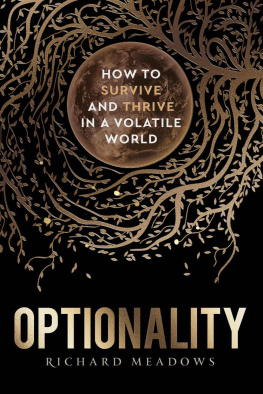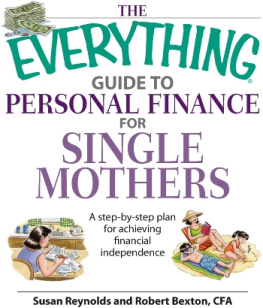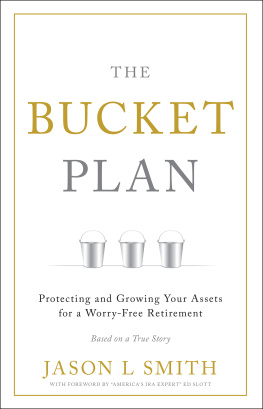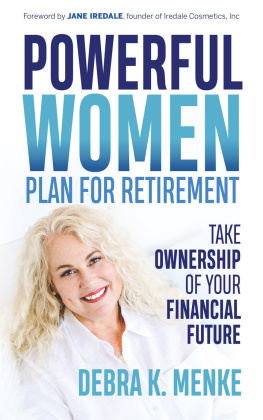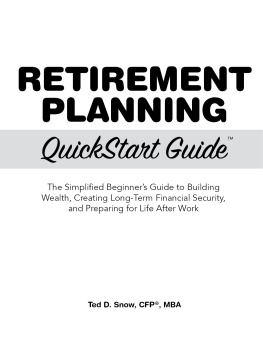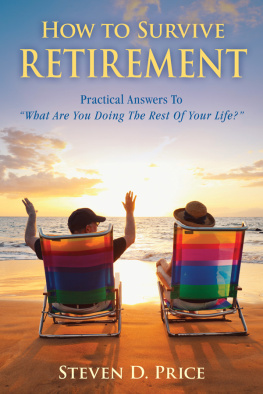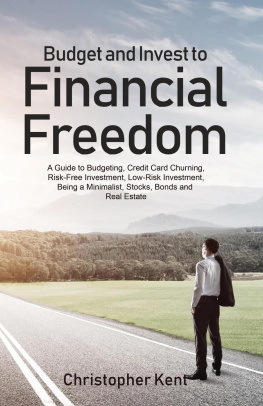FIRST THALES PRESS EDITION
Copyright 2020 Richard Meadows
Illustrations and charts: Dbora Pereira
Cover design: Mexelina
All rights reserved. No part of this book may be reproduced in any form or by any electronic or mechanical means, including information storage and retrieval systems, without written permission from the author, except for the use of brief quotations in a book review.
Thales Press ebook edition: November 2020
Amazon Kindle ISBN: 978-0-473-54552-9
Ebook ISBN: 978-0-473-54551-2
Paperback ISBN: 978-0-473-54550-5
www.optionalitybook.com
Preface
The apparently batshit crazy theory that we're living in a simulated reality is growing on me every day. Maybe we really are trapped in some alien teenager's cosmic jam jar. They're getting bored of watching us over the millennia, so they've decided to give the jar a good old shake.
This is the only reasonable explanation for the adjectival times in which we find ourselves. This year, I personally managed to get rattled by a large earthquake, shivered and sweated through what may or may not have been the new coronavirus, lost my only steady income source overnight, found myself quarantined in Mexico thousands of kilometres away from home, and saw my investment accounts perform acrobatics so death-defying they would make the entire Cirque du Soleil cast quit on the spot. Possible futures flickered in and out of existence on a daily basis, and my perception of time was so warped that I'm still trying to piece together what happened.
My travails took place against the broader backdrop of a global pandemic, riots and looting in the streets, a reality TV star in the White House, jobless claims shooting up so quickly that it looked like a printing error, and California transformed into a post-apocalyptic movie set. The stockmarket crashed faster than ever before in history, and followed up with its most profitable month in 30 years. The price of oil briefly went negative, with traders desperately paying anyone who could take it off their hands. Money printers are still going brrr so fast that central bankers are at risk of getting a friction burn. I expect the plagues of locusts will turn up any moment now.
Welcome to the future, babies. It's not always going to be like this, but we can expect the highs to be higher, and the lows to be lower. Which brings us to the central premise of this book: how can we position ourselves to not only survive this kind of uncertainty, but profit from it?
This might sound gauche while people are dying in horrifying ways, but people are constantly dying in horrifying ways, and besides, I know youre thinking about it. Apocalypse scenarios crank up the dial on all three of the human emotions: fear, hunger, and horniness. I already ate all my emergency snacks by day two of quarantine and this is a family friendly publication, so lets go with fear.
Its hard not to be scared about the future, especially if youve lost your income, are about to enter the job market, or suddenly find yourself missing tens of thousands of dollars from your retirement account. The goal of this book is to get you into a position where you don't have to worry about exactly what the future holds.
This is the position I've been working towards for some time, which means this year has been oddly vindicating. I was expecting an explosion of volatility, which means I managed to not only avoid blowing up, but end the year in my strongest position yet.
I owe my good fortune to a very old idea called optionality. I first came across the concept in the writings of risk analyst and options trader Nassim Nicholas Taleb several years ago, started wondering if it might contain some kind of grand unifying theory of human flourishing, and havent been able to stop thinking about it since.
In tumbling down the optionality rabbit hole, I found answers to several paradoxes I'd been struggling with: the intuition that more options are better vs so-called 'choice overload', the life-and-death importance of having both personal freedom and social constraints, and most importantly, the problem of making decisions in an increasingly uncertain world.
So I started hunting for open-ended opportunities in my own life, taking simple precautions to protect against disaster, balancing my speculative projects, and rejigging my investing portfolio to get exposure to potential moonshots.
I also loaded up on cheap options: reading books and blogs written by weirdos, putting my own ideas out into the world, replying to thousands of emails from readers, and investing my social capitaland occasionally, cold hard cashin friends and strangers whose talents had not yet been widely recognised.
This strategy has worked out nicely so far: mostly in avoiding shooting myself in the foot, but also in systematically exposing myself to serendipitous opportunities. Some of these options are now very much in the money, and the future no longer looks so scary.
I'm finally ready to lay out the optionality approach in full. I've tested early versions of these ideas on my blog, Deep Dish, and my weekly Budget Buster finance column. I've interviewed everyone from CEOs to criminals, billionaires, solo mums, entrepreneurs, polymaths, and philosophers. And I've strip-mined every relevant book and paper I could get my grubby little paws on. All this material has been ground down into its component molecules, and distilled into a set of general principles that anyone can follow. Thats the book youre holding right now.
It's also a compendium of mistakes. The road I took to get here was long and winding, and honestly, kind of stupid. So you might also think of this as my journey to discover age-old wisdom, in the same sense that Columbus discovered the Americas, i.e. entirely by accident, driven by hubris, and 15,000 years too late.
I'm forever grateful to the people who were brave enough to strip down to their financial underwear in public, and helped me open up my own options. This is my attempt to pay it forward.
Richard Meadows
November 2020
What is Optionality?
If you have no optionality at all, life is grim. At best, you're running in place. Stuck in a holding pattern of boredom and frustration; capabilities forever lying dormant.
At worst, you're trapped. Locked into decisions that funnel you towards the abyss. Your brain is stewing in fear and adrenaline. Every decision is reactive. It's a constant struggle to keep your head above water.
Optionality gives you room to breathe. You can take it easy. Wait, wait, waitand then swing for the fat pitches with all your might, using the resources you've gathered so patiently.
Optionality is the power to say no. You can maintain integrity. Walk away from a bum deal, blow the whistle, refuse to do anything that conflicts with your values. Choose to fail on your own terms, rather than succeed on someone else's.
And failure is no longer so terrible. Optionality lets you explore freely. You have a safety net to take risks and chase your hubristic dreams. Theres plenty of slack in the system, and no single breakage point. Tinkering and play are encouraged.

